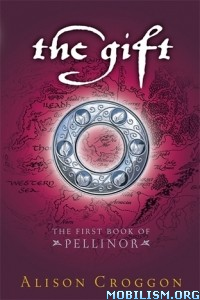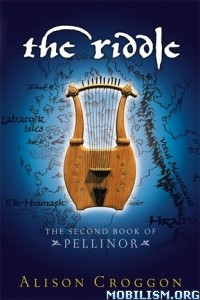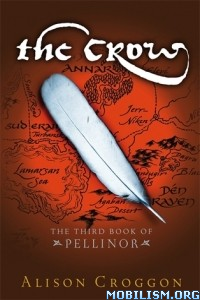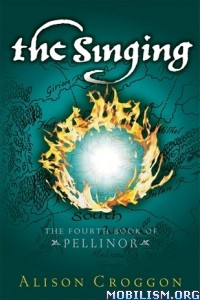



TITLE: The Books of Pellinor
AUTHOR: Alison Croggon
GENRE: High/Epic Fantasy
PUBLISHED: 01/01/2002 - 01/09/2008
RATING: ★★★★★
PURCHASE LINKS: Amazon
MOBILISM LINK: Mobilism
Review: Let’s get this out of the way right now: I hate Lord of the Rings. Completely, unreservedly, unabashedly despise it. The movies were at least pretty to look at, had more women in them, and had some comedic moments, but on the whole even the pretty epically detailed world-building is not enough to convince me that the series (not actually a trilogy, guys) belongs anywhere but at the bottom of my trash-heap.
Sorry-not-sorry.
However, even those who don’t appreciate Tolkien have to admit that he pretty much kick-started modern High Fantasy, at least in Western Europe and the USA – Eastern Europe and every other continent having their own fantastical templates to work with, of course. Pretty much every book (and film) that gets the High Fantasy label follows the same format as LotR; all-male (and all-white) cast, typically with some unexceptional farmboy-type lead, must go on a quest to find or destroy an object, and/or defeat a dark lord, in order to save the world. There is probably a prophecy, the morality is only ever black and white, and the bad guys will be ugly.
Also there will be elves, somewhere. They might be called something else, occasionally, but there will be elves. Apparently this is a rule.
As you might have guessed, I’m not really a fan of this particular sub-genre. There are some brilliant exceptions – brilliant because they break every one of the above rules – but they’re relatively few.
The Books of Pellinor do not break those rules. At its heart, the Pellinor series is as High as fantasy can get; there is a prophecy, there are quests and magic and epic poems, and the fate of the main character is interwoven with the machinations of the inhuman, immortal Elidhu – who are most definitely not elves. There’s even a Dark Lord. But despite all this, The Gift is best defined by what it is not.
Firstly, these are not childrens’ books. I picked up The Gift – also known as The Naming in the US – for the first time when I was ten or eleven in the children’s section of Waterstones, but it is not a children’s book and should not have been shelved there. Croggon’s world-building surpasses Tolkien’s, as The Books of Pellinor comes complete with multiple languages, a tapestry of history and legend, and dozens of fully developed separate cultures and kingdoms – more than half of which are inhabited by people who are not white and yet manage not be members of the Dark Side, unlike Tolkien’s black and white (literally) colouring of good and evil. Like Tolkien, each of the Pellinor books end in pages and pages of appendices and glossaries, with quotes and citations from fictional sources – for Croggon’s fallacy is that the Books of Pellinor are translations of an ancient epic poem at least partly based on real events (a younger skydancer was devastated to realise that of course this was not actually the case!) Unlike Tolkien, Croggon manages her world-building deftly, imparting her universe to the reader so subtly and smoothly that one never feels overwhelmed – and never has to trudge through pages and pages of irrelevant exposition.
Secondly, as implied above, Croggon’s world is not your typical patriarchal quasi-Europe. Here there are no kings, with the lands of Annar and the Seven Kingdoms ruled, in so far as anyone rules, by Bards, magic-wielding musicians and healers gathered into Schools to oversee the Balance and Way of the Light – a much more complicated process than previous simplistic fantasies would have you believe. Bards, or Dhillarearë, live three times as long as normal humans and are marked by their inborn Speech, the language of beast, bird, fish and star – but despite this, Croggon’s Bards are wonderfully human, men and women who struggle with the responsibilities of their powers and make sometimes terrible mistakes. Several times over the course of the series we see Bards led down the wrong path by good intentions or fear, and this is not a world where everyone understands instinctively what is good and what is evil; the Light is something each Bard must come to on their own, the Balance a philosophy that is constantly debated.
Thirdly, this is not a simple quest of good versus evil. For one thing, Croggon dispenses with the idea of only one ultimate enemy; the main character is beset from all sides, and many people who would call themselves ‘good’ are turned to evil ends by the manipulations of those above them. Although there is a Dark Lord, his motivation is disturbingly understandable; in being too afraid of death, he gave up his humanity to be rid of mortality, and the result was, logically, a monster. But there are also the Elidhu, the elemental manifestations of mountains and forests, who are themselves multi-faceted and divided into factions, some of whom help the main character, and some of whom hinder her. Then there are the Bards who, a little like Tolkien’s Saruman, believe themselves to be in the right but are not allied with ‘the Dark’ at all. And below all of them are the normal human people, divided into kingdoms, clans and tribes, who are trying to do their best but are manipulated, betrayed, and beset by misunderstandings. There’s a particularly poignant example of this in book two of the series, The Riddle, after the main character has been kidnapped by lackeys of one of the Elidhu...
Nim laughed. “My people are not peaceful,” he said.
“Peace is better than killing,” said Maerad with feeling.
“I think so too.” Nim was silent; he seemed to be remembering something. “I used to like gathering the wildflowers with my sister. We were sent out to get berries and we would gather flowers instead. My mother would be very angry.”
Maerad looked at him curiously. “An old woman told me that the Jussacks keep their women in holes in the ground,” she said.
“That’s not true. Pilani lies,” Nim spat.
“Well, maybe the Jussacks tell lies about the Pilani, too.”…
“Maybe what they tell about the Pilani are lies. But would we stop warring against them if there were no lies?”
“You might.” Maerad leaned on her elbow and looked at him.
“And we might not,” said Nim. “I don’t know.”
This kind of questioning takes place throughout the books, with Croggon refusing to paint the world in black and white or present only a single philosophy of what it means to be good. Over and over Maerad, our main character, is forced to acknowledge that good and evil just aren’t as simple as she (and we) would like them to be, even when it comes to things like murder – and I don’t mean killing in self-defense, either, but straight-up murder. Nor does different have to mean bad, or uneducated mean stupid or lesser. If that sounds like the simplistic moralising of a children’s novel – well, it isn’t. It’s bitter and brutal and tragic, with loss and grief woven through the incredible beauty and epic scope of Croggon’s quartet. Words are spoken that can’t be taken back, mistakes made that can’t be undone, things lost that can’t ever be regained. Often the choices are between bad and worse, and Croggon does an excellent job at depicting the incredible loneliness of being a Chosen One, while simultaneously showing how absolutely vital it is to live life to the fullest, to experience every moment of joy as fiercely as you can.
She sat down on the deck and looked searchingly up at the stars. There, just as she had seen it in Gilman’s Cot, blazed Ilion, solitary and bright. She thought of Hem: where was he now? Was he too staring up into the night sky, thinking of her? And maybe her mother, Milana, also had done just this; maybe she too had searched for the brilliant jewel of Ilion among the constellations, and thought of it as her star.
Here on the earth’s surface, thought Maerad, people labor and suffer and die. Does any of that anguish touch Ilion? She wondered if the stars could sense the vibrations of human joy and wonder, of grief and despair. Did the stars know what was right and wrong? What were the Dark and the Light to them? She remembered what Ardina had said to Cadvan: the Light blooms the brighter in the darkest places. Perhaps, at this distance from human affairs, another pattern emerged from the chaos, another kind of necessity, and even evil became part of a larger music.
Maerad stared into the sky, feeling her heart pulsing in her body and her blood coursing through each tiny vein. She felt as if she keenly understood, for the first time in her life, the intricate relationships between all things, a web of infinite beauty and complexity. Between the small orb of her eye and the distant star, she felt the pull of a tiny glowing thread, one of the infinite gravities that wove together the living and the dead, the far and the near, the tiny and the immense, in one everchanging, everrenewing world.
This is also an unabashedly feminist series. In the Books of Pellinor, Croggon flips the trope around; instead of an unexceptional farmboy discovering he’s supposed to save the world, it is Maerad, a sixteen year old orphaned slave girl, who gets swept up into a living legend. (Before you sneer and dismiss this as a YA series based solely on Maerad’s age – although why the hell would you be sneering at YA? – remember that plenty of adult High Fantasies begin with teenage protagonists. Around half of the characters in Kate Elliot’s Crown of Stars series walk onto the first pages in their teens, and many more High Fantasies start while their protagonists are outright children. It’s not the age of the main character that determines whether a book is YA or not). Many of the Schools Maerad visits are led by female First Bards, including Innail and Busk, and Ardina, the Elidhu who is vital to Maerad’s quest, is a woman. More than half of the important characters Maerad meets on her quest are women of power and prestige (of all kinds – they’re not all Bards, and their power comes in different forms, as it should) and this is treated as nothing to comment upon by the narrative; the world of the Bards is one just as open to women as men, and in fact one of the series’ villains is marked by his misogyny – not the coarse, unsubtle sexism that is so easy to condemn, but an insistence that women should not be Bards, and a refusal to consider that the Foretold One might have been born a girl instead of a boy.
As I mentioned before, this is not a series populated by quasi-European Caucasians. Saliman, a black-skinned Bard from the South, is introduced early in book one of the series, although he remains a minor character until book three, which is set entirely in the south with only one lighter-skinned character, and Maerad herself is one of the only white characters in book two, during which she visits the olive-coloured Thoroldians and the dark, nomadic Pilanel in the North. Racial tensions play a significant part in the series; Saliman endures barely-concealed racism from many of the white Bards and nearly all Bards consider the Elidhu to be something less than human, closer to animals – and thus, look down on and are suspicious of those Bards with Elidhu blood. Maerad’s gradual discovering of her family history is important to the arc of her character but also vital to the plot, even as she receives distrust and suspicion when others learn of it. Although none of the human cultures are demonised, I did find it ironic that it was the darker-skinned peoples who tended to be more accepting of Maerad’s strangeness and chequered history; it makes for a nice contrast to the more traditional, all-white High Fantasies I’ve seen too often.
The great plot itself is tied to the second rise of the Nameless One – the Dark Lord I mentioned earlier – and the search for the Foretold One meant to stop him. But things are of course complicated by many people’s unwillingness to admit that this is the time of prophecy at all, never mind whether an uneducated slave girl could possibly be the Foretold One. Amidst all this are the after-effects of some great horror wrought by the Nameless One upon the Elidhu centuries ago, and the Elidhu’s divided attempts to heal that horror. Music plays a vital role, with Maerad’s ‘quest object’ being something called the Treesong, and meanwhile the Nameless One is building a mechanical army in the furthest South…
Look, LotR? A bunch of annoying white dudes without a personality between them going off to drop a ring in a volcano, with a whole lot of pretentious exposition on every other page, written in a style reminiscent of the Bible. The Books of Pellinor are a feminist epic about a quest for the soul of all magic, with complex, flawed, multi-coloured characters going up against immortals with nothing but music. It’s both emotionally and morally more complicated than LotR, and more honest and unflinching. If nothing else, give this to your daughters and your sisters, because if men are too afraid to pick up a book where the Chosen One has periods, then at least us girls can enjoy a real epic fantasy for once – one that’s better, in every way, than Tolkien’s boring LotR or Jordan’s ridiculously padded Wheel of Time.
Oh, and for the record? I’d bet on Maerad over Rand al’Thor any day.